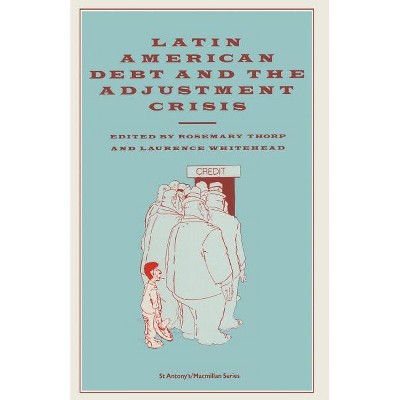Sponsored

The Miami Fiscal Crisis - by Milan Dluhy & Howard Frank (Hardcover)
In Stock
Sponsored
About this item
Highlights
- Drawing heavily on contributing cultural and ethnic factors, this book analyzes Miami's fiscal insolvency since 1996 and describes what led to the financial crisis, the explanations for the crisis, and the reasons for a slow recovery.
- About the Author: MILAN J. DLUHY is Professor and Chair, Department of Political Science and Public Administration, University of North Carolina at Wilmington.
- 192 Pages
- Business + Money Management, Public Finance
Description
About the Book
Drawing heavily on contributing cultural and ethnic factors, this book analyzes Miami's fiscal insolvency since 1996 and describes what led to the financial crisis, the explanations for the crisis, and the reasons for a slow recovery. Comparing Miami's insolvency with the earlier fiscal crises in Philadelphia, New York City, and Orange County, CA, the authors show the role of Miami's poor economic climate, the increasing ethnic influence, the emphasis on fiscal conservatism and a pay-as-you-go philosophy, the lack of standard and professional budgetary practices, and the corruption of several city officials. In conclusion, the authors consider Miami's outlook for the future.
To fully understand Miami's original crisis and the extremely slow financial recovery, the authors believe it is necessary to explore how the dominant culture contributed to the city's financial problems. The authors show that structural features of the local government are less important than broader cultural and ethnic attitudes and practices.
Book Synopsis
Drawing heavily on contributing cultural and ethnic factors, this book analyzes Miami's fiscal insolvency since 1996 and describes what led to the financial crisis, the explanations for the crisis, and the reasons for a slow recovery. Comparing Miami's insolvency with the earlier fiscal crises in Philadelphia, New York City, and Orange County, CA, the authors show the role of Miami's poor economic climate, the increasing ethnic influence, the emphasis on fiscal conservatism and a pay-as-you-go philosophy, the lack of standard and professional budgetary practices, and the corruption of several city officials. In conclusion, the authors consider Miami's outlook for the future.
To fully understand Miami's original crisis and the extremely slow financial recovery, the authors believe it is necessary to explore how the dominant culture contributed to the city's financial problems. The authors show that structural features of the local government are less important than broader cultural and ethnic attitudes and practices.About the Author
MILAN J. DLUHY is Professor and Chair, Department of Political Science and Public Administration, University of North Carolina at Wilmington. He formerly was the Research Director for the Blue Ribbon Task Force on City Administration which played a role in Miami's recovery effort.
HOWARD A. FRANK is Associate Professor of Public Administration in the School of Policy and Management at Florida International University, where he also serves as Director of the Institute of Government. He was of a member of the Blue Ribbon Panel established to assist in Miami's recovery effort.










